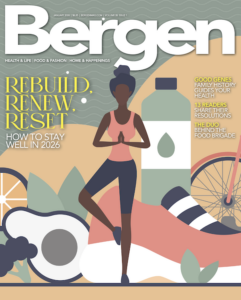6 Breastfeeding Myths + How to Get Help
A Bergen-based lactation consultant clarifies the myths associated with breastfeeding—and shares how to get help—in honor of World Breastfeeding Week.

We’ll tell it like it is—being a mom is a hard job, and breastfeeding is among the struggles for many of us. Despite what pop culture may lead us to believe, for many moms and babies, breastfeeding does not come naturally, and it often requires some assistance (and a lot of patience) to get it right.
That’s part of the message behind World Breastfeeding Week 2021, Aug. 1–7. This initiative seeks to normalize breastfeeding and to educate moms and moms-to-be about its benefits. At the same time, its goal is to remove the pressure to breastfeed if it’s not working out (we have enough of that from elsewhere, thankyouverymuch).
“Whether or not a mom plans to breastfeed, your body will make milk for your baby by day three after giving birth,” says Jennifer Leopold, LSW, owner of First Latch & Counseling, Inc. in River Edge and an IBCLC (International Board Certified Lactation Consultant), a designation earned after completing hands-on, extensive clinical training to help women breastfeed no matter the struggle. “Taking a class while you’re pregnant or reaching out to organizations like La Leche League of Ridgewood is a great way to learn more about it before even having your baby.”
And if you’re one of those new moms who can’t quite figure out why your baby won’t latch, why your supply isn’t keeping up with demand or why you’re in pain while nursing, you don’t need to suffer alone. Here, Leopold helps us debunk six major breastfeeding myths. Then, we share our list of Bergen-based resources that can help you (or the new mama in your life) when help is needed most.
Myth: It’s normal for breastfeeding to hurt.
Uncomfortable having your nipples tugged and pulled on, sure, but painful? No way. “Like birth, breastfeeding is meant to be done in a community, so if you’re experiencing pain or injury, reach out to someone who is familiar with the proper latch,” says Leopold. Proper latch for nursing, she says, is not the same as a baby sucking a thumb or a bottle. “Place the nipple above the baby’s upper lip so the baby will open their jaw as wide as they can so your nipple goes all the way in the back of the mouth,” she says. “This way, the nipple won’t be crushed.” An IBCLC can help you and your newborn establish this.
Myth: Some women don’t produce enough milk.
Nope. “Even if you’re not making a full supply for your baby, you can still breastfeed for as long as or as short as you want with what your body does make,” Leopold says. It’s not all or nothing, and you should not feel badly about supplementing with donated milk or formula.
Myth: Nursing newborns should not supplement with a bottle or suck on a pacifier.
Not right away, at least. Most lactation consultants advise that breastfeeding and proper latch should be established before a bottle or a pacifier is introduced, but once the mom feels comfortable with how nursing is going, she can introduce plastic nipples. “This could happen after one or two weeks,” Leopold says.
Myth: You shouldn’t nurse your baby if you’re sick or if you just received the COVID vaccine.
Not true. Just like a vaccine will keep you safe, so will breastfeeding your baby after vaccination if you or he/she is not feeling well. “Our milk makes amazing antibodies, so if we’re sick or we get COVID, we’re passing on only the good properties to the baby to keep them safe,” says Leopold.
Myth: Breastmilk is static and always remains the same like formula.
False. “Our milk changes from feed to feed, day to day and stage to stage,” Leopold says. Somehow, our body knows what the baby needs and breastmilk changes to meet those needs. For example, breastmilk pumped or expressed at night produces melatonin to help baby sleep, and the milk will produce antibodies if your little one has a cold.
Myth: You can’t breastfeed a baby with teeth.
It might not be enjoyable, but no, teeth do not affect latch. “Breastfeeding is about where the baby’s tongue and jaw are positioned, so teeth have nothing to do with successfully taking milk out,” Leopold notes. “And as with sicknesses, we make antibodies in our milk that helps the baby [feel better while] teething.”
And below, check out our list of seven Bergen County-based prenatal and postpartum resources who can help you—or your daughter, your niece or a family friend—when a little extra support is required:
- Bergen Doula, offering doula services during pregnancy, during labor and delivery and after birth, in addition to lactation consulting services with a CLC (Certified Lactation Consultant). 201.245.7614
- The Family Birth Place at Englewood Health, based in Englewood Health hospital, offering prenatal breastfeeding services, consultations within the mother/baby unit and a breastfeeding hotline for once you leave the hospital that you can call with non-urgent matters and questions. A lactation consultant with return your call within 24 hours. 201.894.3354
- First Latch & Counseling/Bergen Lactation, based in River Edge, offering prenatal breastfeeding classes, lactation support, postpartum services and moms’ groups. 917.750.9708
- Hackensack Meridian Health, based in Hackensack, offering outpatient lactation consultations. 996.4606
- Holy Name Medical Center’s The Birthplace, based in Teaneck, offering breastfeeding classes held one Sunday every month. 201.833.3153
- The Nesting Place, based in Ridgewood, offering parenting and birthing classes, prenatal yoga, labor and postpartum doulas, lactation consultations, mommy-and-me classes and more. 201.623.3629
- The Valley Hospital’s Center for Family Education, based in Ridgewood, offering in-person and virtual lactation consultations for all new moms. 201.291.6152
You can also find an individual lactation consultant in your area on UCLSA’s website.

